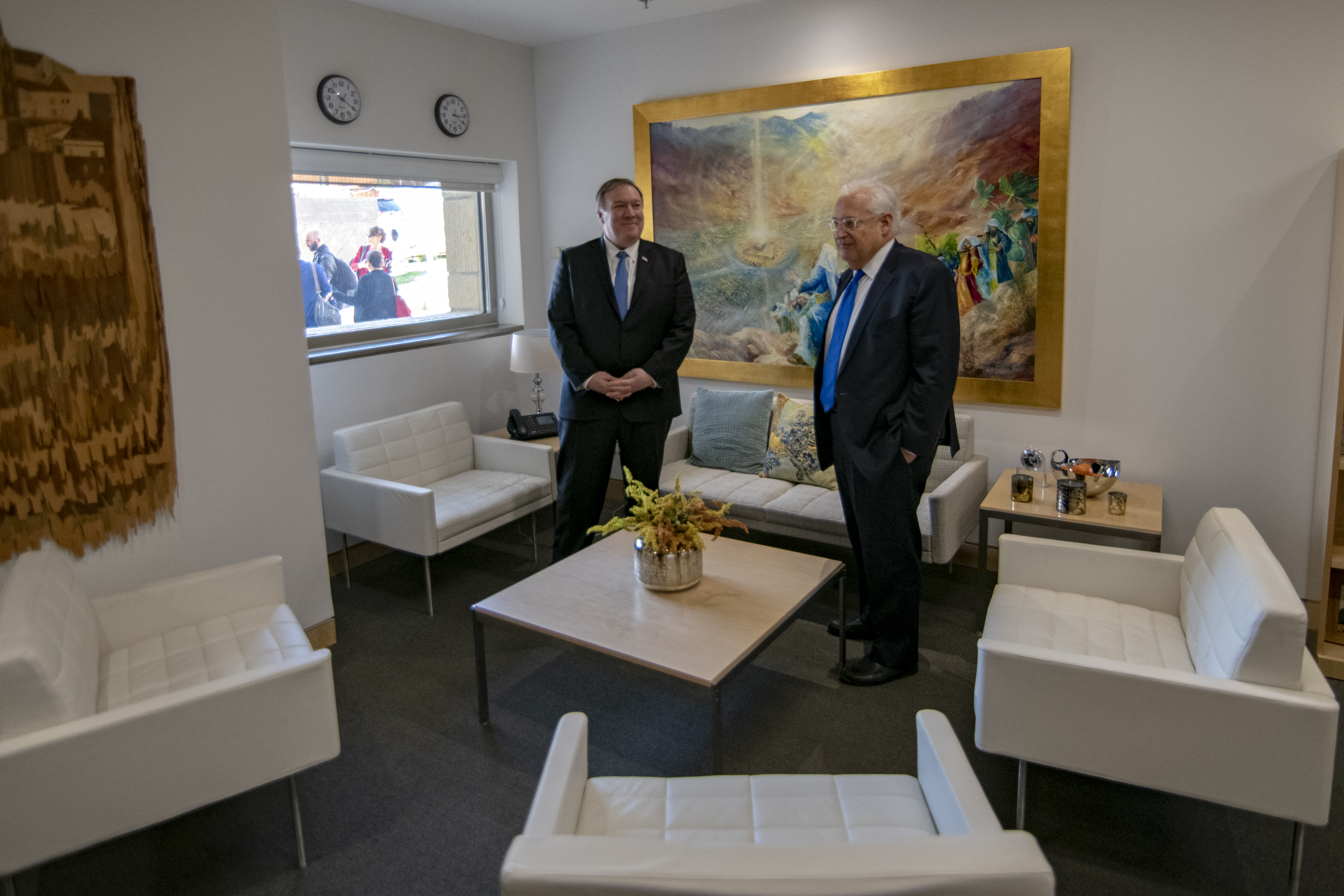THE ANGRY ARAB: Trump ‘Solves’ the Arab-Israeli Conflict
This plan goes beyond all previous U.S. commitments to Israel and of course it too will not work, writes As’ad AbuKhalil.
By As`ad AbuKhalil
Special to Consortium News
Special to Consortium News
 Glory has long motivated U.S. presidents in their approach to the Arab-Israeli conflict. That has been clear since the administration of John F. Kennedy attempted to “solve” the intractable conflict.
Glory has long motivated U.S. presidents in their approach to the Arab-Israeli conflict. That has been clear since the administration of John F. Kennedy attempted to “solve” the intractable conflict.
They all know that by solving the conflict, once and for all, they would manage a secure place for their names in history. And for many of the biblically-minded presidents there are also religious motivations in associating their names with “peace plans” which aim to reward or elevate the status of biblical Israel. (Jimmy Carter in his book, “The Blood of Abraham,” could not distinguish between the modern occupation state of Israel, and Israel of the Bible.)
The appeal of the Arab-Israeli conflict to U.S. presidents was also due to the Cold War, when the two superpowers often faced off in the region, although the Soviet Union never committed to the side of the Arabs to the same degree as the U.S. committed to the side of Israel. And the U.S.S.R. never supported the Arab public desire for the full liberation of Palestine. Instead, Soviet leaders cautioned Arab leaders (particularly PLO leaders) against maximalist demands.
Trump was no different in wanting to solve the Arab-Israeli conflict. During his campaign for president, he stressed his will to solve the Arab-Israeli conflict. The attraction, for Trump, would be a tremendous ego boost for a president living in the shadow of the international aura of Barack Obama.
Trump rattled the Zionist lobby when he first declared his intention to be neutral on the Arab-Israeli conflict. But under the influence of evangelical Christians (perhaps the most powerful pro-Israeli lobby within the Republican Party) and Sheldon Adelson (as the chief funder of the Republican Party under Trump), Trump did not stick long to the vow of neutrality.
While he dared to challenge many established norms of U.S. politics, he quickly conformed to the established pro-Israel position and went even further than previous presidents in identifying his government with the state of Israel. There are no rewards in the Republican Party for defying or challenging Israel.
Kushner in Charge

Jared Kushner. (DoD/Dominique A. Pineiro)
The announcement of the “Deal of the Century” had been delayed but it was finally unveiled last week, perhaps as yet another contribution from Trump to Prime Minister Benjamin Netanyahu’s political campaign. The Trump’s peace plan was the best kept-secret in D.C. and there is no mystery as to why it stayed that way in a city notorious for leaks.
The plan was prepared in the office of Jared Kushner, Trump’s son-in-law, and none of the regional Middle East offices of the U.S. government departments and agencies were consulted. Kushner looked down at professional Middle East experts at the State Department and he kept them at bay. Kushner regarded all previous U.S. efforts at Arab-Israeli peace as being a failure, which is not inaccurate.
In fact, all previous U.S. efforts during the long history of the unending Middle East “peace process” paved the way for this most pro-Israel American “peace plan,” because almost every administration has to prove, for political reasons, that it is more pro-Israeli than its predecessor. (The exception was the administration of George H.W. Bush, in which the president and James Baker, his chief of staff and secretary of state, were willing to publicly challenge the stances of the Israeli government.)
Previous U.S. peace mediations allowed Israel to set the agenda and to set the terms of every agreement. Israel also had veto power over what could be discussed. All issues of “final status” were shelved until a future date, because they were dependent on the ability of the Palestinian people to prove their qualifications and credentials as people — and it was left to Israel to be the sole arbiter of the qualifying credentials of the Palestinians — as a people deserving of nationhood.
Recent U.S. Gifts to Israel

U.S. Secretary of State Mike Pompeo tours U.S. embassy in Jerusalem with U.S. Ambassador to Israel David Friedman, March 21, 2019. (State Department/Ron Przysucha via Flickr)
But this plan goes beyond all previous U.S. commitments to Israel, and it came on the heels of a set of U.S. political gifts to Israel:
1) the relocation of the embassy from occupied Jaffa to occupied Jerusalem;
2) the acceptance of Israel occupation of the Golan;
3) the American official endorsement of Israeli occupation of the West Bank as non-occupation (the refusal to regard Israeli settlements as “illegal under international law”—which has been the official U.S. position since 1967, although various U.S. presidents tried to dilute the definition);
4) the denigration of the Palestinian Authority and the closure of the PLO office in D.C. (even though that office, since the Oslo accords, has become a mere client of the U.S. and Israeli governments).
This plan basically takes an official position on the boundaries of the future Palestinian state. Under previous administration, the U.S. basically left it to Israel to decide on how much it wished to retain from the West Bank after withdrawing from most it. (The U.S. agreed with Israel that the 1967 borders were not defensible for Israel occupation but left it to Israeli and Palestinian negotiators to decide on the exact size of territorial retention).
Under this Trump-Kushner plan the Palestinians will get something along the lines of 70 percent of the West Bank while Israel gets to retain the remaining 30 percent of what is a mere 22 percent of historic Palestine (that is Gaza and the West Bank). So, the Palestinians, who were not eager to accept 22 percent of their homeland (although the PLO had accepted this unfair and unjust “compromise”), will have to settle on 70 percent of 22 percent of their historic homeland.
Illusion of Contiguity
The plan also makes sure to prevent the ability of the Palestinians to create a mini-state (albeit demilitarized and lacking in sovereignty); the land is divided into an archipelago of small patches of land that are not contiguous, but that tunnels and roads (all under direct Israeli military control) would give it the illusion of contiguity.
Furthermore, the Israeli government will get to exercise total air, land and sea control over the Palestinian territorial islands. And the plan does not even promise political independence to the Palestinians but leaves the decision to Israel to decide if and when the Palestinian people (or what is left of them in those lands) have reached sufficient political maturity.
The plan manages to quash all aspirations of the Palestinian people, and that is not surprising because Kushner and company decided for the first time in the history of U.S. Middle East diplomacy that the Palestinians need not be consulted on a plan affecting their future. (In previous decades, especially after 1967, U.S. administrations up until 1988, ignored direct negotiations with the Palestinians and assigned the Jordanian regime or other Arab governments to represent the Palestinians).
The plan does not provide for the return of Palestinian refugees (a very small percentage, not exceeding 50,000 over all would be allowed to return to the West Bank, but not to their own homes inside what is today Israel) and require that the Palestinians recognize Israel not only as a state, but as a Jewish state — i.e., the Palestinians are required to accept the relegation of fellow Palestinians inside the 1948-borders of the Israel state to second-class status.
Worse, to recognize Israel as a Jewish state (as the U.S. has done) is to recognize the right of the Jewish state to expel population (ethnic cleansing) on the basis of religion/ethnicity if it deems their births or presence to be threatening to the Jewish identity of the state. As for the capital, the Palestinians are presumably to be fooled to accept a little suburb, Abu Dis, as an alternative to their historical religious and emotional capital of Jerusalem.
Of course, this plan has no chances of success and even the stalwart U.S. clients in the Gulf, could not get to accept the plan and agreed through an Arab League statement to join Palestinian rejection of the plan. If Kushner — parroting Zionist statements to the effect that Palestinians miss opportunities — thinks that the Palestinians should not miss this opportunity afforded to them, he will have a hard time finding one Palestinian willing to accept this opportunity. It is like wondering why the colonized would turn down offers of legitimization and prolongation of colonialism.
As’ad AbuKhalil is a Lebanese-American professor of political science at California State University, Stanislaus. He is the author of the “Historical Dictionary of Lebanon” (1998), “Bin Laden, Islam and America’s New War on Terrorism (2002), and “The Battle for Saudi Arabia” (2004). He tweets as @asadabukhalil
The views expressed are solely those of the author and may or may not reflect those of Consortium News.


0 Comments:
Post a Comment
Subscribe to Post Comments [Atom]
<< Home